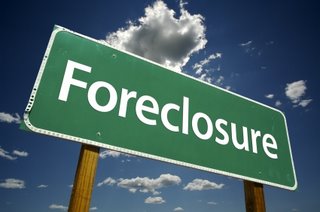Archive for the ‘foreclosure’ Category
Thursday, October 7th, 2010

We can hope so, but we’ll have to wait and see.
A few days ago we reported on GMAC and JPMorgan Chase – that they were temporarily suspending all foreclosures in 23 states while they investigated claims of “robo-signing” of foreclosure documents.
The next day Bank of America also suspended foreclosures in those 23 states.
Why 23 states? Because those states are the ones that require court approval for foreclosures. In lieu of actually going to court, they are allowed to present signed affidavits swearing that they have reviewed the files and the documents are in order.
The trouble was, they didn’t review the files and in some cases the documents were not in order. In some cases, even the monetary figures were “off.”
Their excuse for this sloppiness was that with 8 to 10 thousand forms to sign each month, they just “didn’t have time” to do it according to the legal requirements. Statements by banking officials carry a tone that suggests that since they are so busy, they are justified in cutting these corners – in spite of the potential damage to individual homeowners.
Now key lawmakers are demanding that more than 100 mortgage companies halt foreclosures while they determine whether foreclosure documents they approved might have contained errors.
The 23 states involved in this action are Connecticut, Delaware, Florida, Hawaii, Illinois, Indiana, Iowa, Kansas, Kentucky, Louisiana, Maine, Nebraska, New Jersey, New Mexico, New York, North Dakota, Ohio, Oklahoma, Pennsylvania, South Carolina, South Dakota, Vermont and Wisconsin.
But now, other states are weighing in.
The Texas Attorney General’s office has called for a halt on all foreclosures. They’re also asking for a halt on sales of all properties already under bank ownership as well as all evictions of persons residing in those foreclosed homes. They’re giving the banks until October 15 to reply to the demand letters.
Maryland Governor Martin O’Malley has done the same.
In Oregon, Senator Jeff Merkley has urged the Treasury Department and the Department of Housing and Urban Development to launch investigations, while Massachusetts Attorney General Martha Coakley said her office is already investigating an “Apparent failure of major creditors to follow state foreclosure law.”
In California, Attorney General Jerry Brown called on J.P. Morgan Chase & Co. and Ally Financial Inc. to suspend foreclosures unless they can prove that they are in compliance with state law.
Real estate professionals dealing with Short Sales have long been frustrated by the sloppy paperwork, lost documents, and delays that they and their clients have endured at the hands of the banking giants. At times, homes that were in the midst of short sale transactions or even loan modifications were suddenly foreclosed upon – despite assurances that the foreclosure had been halted.
Now we realize why this has happened. Employees in the Foreclosure departments simply did not read the files and thus were not aware of the loan modifications or short sales in progress.
Will the banks be punished for their fraudulent behavior? Will they owe monetary damages to homeowners who were harmed? Or will this sloppy behavior be forgiven and swept under the rug?
We’ll all be watching to see the outcome.
Tags: foreclosure, fraud, mortgage news
Posted in foreclosure | Comments Off
Friday, October 1st, 2010
Fraud, greed, and government regulations led to the crash of the housing market. Now banking fraud, greed and general carelessness could lead to a stabilization in the housing market.
Why?
Because the expected glut of foreclosed homes is not going to hit the market soon. Thousands of foreclosures are being delayed and could even be cancelled.
As of now, JPMorgan Chase and GMAC have suspended all foreclosures in 23 states. GMAC didn’t provide a number, but Chase is suspending 56,000.
Home sales have been undermined these past months by the expectation that large numbers of foreclosures were about to be released – causing housing prices to slide further. That expectation has caused many consumers to put off buying a home.
If the flood stops or slows considerably, housing prices may stabilize.
How did this happen?
In their quest to speed up the foreclosure process, banks have been cutting procedural corners. Both GMAC and Chase have admitted to filing affidavits for summary judgment without knowing if the facts stated in those affidavits are true.
By signing the document, the signer indicates that he or she has personal knowledge that those facts are true. That means the signer is saying that he or she has reviewed the cases and knows the documents are correct. And that hasn’t been the truth.
It appears that banks have been taking their procedural cues from our Senators and Representatives – stating in their own defense that since they have so many foreclosures to process, they simply didn’t have time to review the cases before signing the affidavits and other documents.
The term “robo signers” has been coined to describe the way banks have handled the signing of legal documents.
Unfortunately for them, those lawmakers who sign bills into law without reading them aren’t stepping up to say its OK to file affidavits without reviewing the cases.
Shifting the blame is nothing new, and apparently banks are shifting the blame to the legal firms who supply the documents for signing. According to the South Florida Sun-Sentinel, Florida’s four largest foreclosure law firms are now under investigation for fraud.
Flordia is one of the 23 states where Chase and GMAC have suspended foreclosure activity for the time being.
Consumers are “lawyering up”
Lawsuits are already being filed, and according to lawyers representing homeowners, the lenders will likely be defeated in court due to their own carelessness. Many of the necessary documents have been misplaced or otherwise disappeared.
This will come as no surprise to real estate professionals who deal with short sales. They have been struggling with the lenders’ “lost document syndrome” for the past couple of years.
Although no others have admitted wrong-doing, Chase and GMAC are not the only banks affected. Experts predict that all banks will now take a closer look at procedures in an effort to avoid lawsuits from homeowners who feel they have been wronged.
The expectation is that banks will make a greater effort to keep people in their homes rather than rushing to foreclose. That, of course, would be good for homeowners, neighborhoods and housing prices.
Exposing and halting fraudulent activity is always a good thing. But there is one “fly in the ointment” in this situation.
Homeowners whose foreclosures are final and whose previous homes have been sold may be stepping forward to file lawsuits. If the courts find that the completed foreclosures were in fact done improperly, families who bought those foreclosed homes could find themselves entangled in a legal mess not of their own making.
Could this possibility at least temporarily slow the popularity of buying banks’ REO properties?
Tags: foreclosure, fraud, mortgage news
Posted in foreclosure | Comments Off
Sunday, November 30th, 2008

There is one thing for sure, perception affects any market. You hear “buyers market” and buyers think they are going to get this magnificent deal on a home. Regardless of who owns a home, the owner’s want what the market will allow for that particular home. That is the case with bank foreclosures. Just because a bank took back a home does not mean you will get any better of a deal than if you bought that home from the original owner.
In some cases depending on the bank you can get a one of their properties for usually between .75cents to .90 cents on the dollar. But one thing I assure you is the bank will do what is called a B.P.O. on the property. The asset manager usually requests this from the realtor that will be listing their properties for them. B.P.O. is broker price opinion, which will give the real value of the home in that particular real estate market it’s in.
What’s does this mean for a buyer? Let me ask you this, if it was your house to sell wouldn’t you find out the true value of your asset to get some idea what you could sell that asset for? Absolutely….. You would. Banks done give homes away, they sell them to get that home off their books for market value.
So if you are in the market currently for a home, don’t get this idea that you will get a home for nothing just because the home is a foreclosure, even if that home has been on the market for 2 years. A bank or Asset manager is not ignorant. They know what the house is worth, and if you offer them some ridiculous offer they might refuse to deal with you period. Asset managers are extremely busy in this market and don’t have time to deal with offers that are a waste of time.
Yes, in some cases you can get a home for a little less than current market value, but you have to shop around and have a very experienced real estate professional at your side.
One more note, it’s called a buyers market because the homes for sale out weigh the number of buyers out there.
CreditScoreQuick.com
Posted in foreclosure | Comments Off
Saturday, July 5th, 2008
 Your life during a foreclosure might seem never ending. A foreclosure does affect your credit score report, but the good news is there is life afterwards. If you have fell victim to the Sub-Prim meltdown which caused you to loose your home, I will explain to you how you can recover from this fairly quick. Obviously anytime you have a negative mark on your credit report it will stay on there for 7 years. The positive side is you can implement some good credit management steps to recover. Your life during a foreclosure might seem never ending. A foreclosure does affect your credit score report, but the good news is there is life afterwards. If you have fell victim to the Sub-Prim meltdown which caused you to loose your home, I will explain to you how you can recover from this fairly quick. Obviously anytime you have a negative mark on your credit report it will stay on there for 7 years. The positive side is you can implement some good credit management steps to recover.
It will be a minimum of 3 years after foreclosure date before you can buy a house again. FHA and Conventional loans have a 3 year seasoning requirement before they will allow you to get financed. By implementing what I am about to teach you, you can still get your credit in the right direction.
Step 1: Late Payments
Make sure you don’t have anymore late payments on any of your other obligations. Late payments will destroy your credit.
Step 2: Credit
Make sure you have at least 3 lines of credit reporting on your credit report. This could be a couple of credit cards, secured credit cards, car loans, and installment loans.
Step 3: Rental
Make sure you have excellent rental history. Don’t be late on your payments to your landlord. When you get ready go buy a new home in 3 years, this is a must, and make sure the rental payment is fairly close to what you new mortgage payment would be. The reason is if you are ready to buy a home and your rental was $400 to $500 less than your new mortgage payment, the bank will consider that payment shock. So watch this closely.
Step 4: Savings
Save your money, you should have at least 6 months worth of mortgage payments in your savings. The banks like to see that you have the ability to save.
Step 5: Learn from your mistakes
After you have experienced a foreclosure, make sure you don’t have the something happen again. Fair Isaac the creator of the FICO score will forgive credit mistakes, but the new FICO 08 does not forgive repeat offenders too well. So don’t make the same mistakes twice.
Stuff comes up during our little journey here on earth, but we can make matters a lot better with good credit management. If you are not rich, there will come a time where you need to borrow money. It can be a little frustrating when you need a loan and you cannot get one because of bad credit. Once you implement what I have mentioned you will be well on your way to good credit health.
CreditScoreQuick.com
Posted in bad credit, credit, credit report, fix bad credit reports free, foreclosure | Comments Off
Wednesday, May 21st, 2008
Foreclosures are pretty active currently across the country. As more and more adjustable rate mortgages (ARM’s) are set to expire, and the values of the homes continue to fall, the home owner has no choice but to foreclose on their home. The reason is the value is not in the home to roll in the closing costs associated with a refinance. With all of this going on there is hope to buy a home in the near future, as long as you take the necessary steps to get your credit report and credit scores revived.
Q:
Hi Mike,
I recently had a foreclosure due to my ARM expiring, we did not have the credit nor the value to refinance our house. So we had no choice but to let it go. I feel like we really got taken advantage of with the bad loan we were put in. My question to you is how long will it be before we can buy again, and what necessary steps do we need to take so we can buy.
Thanks for your help
Teresa Blonde
Colorado Springs, Colorado
A:
Foreclosures are definitely one of those situations that is not pleasant. All of these subprime loans that were giving were like a double edged sword, if you did not go with the subprime loan you did not get a house, if you went along with the subprime loan you got a house with ugly terms. Anyways, in order to buy a home, you will have to wait a minimum of 3 years.FHA loans will be the type of financing you will be able to get. They require 3 years from foreclosures date. In regards to your credit, depending on what type of credit you have if any, you will need at least 3 lines of credit reporting on your credit report. For example; a couple of credit cards, and maybe a car loan. If you don’t have any credit, you will need to get a couple of secured credit cards. You can get these cards at our site, www.creditscorequick.com/secured_cards.
Mike Clover
CreditScoreQuick.com
Posted in foreclosure, free credit check, free credits core report | Comments Off
Wednesday, April 9th, 2008
 Are you currently having trouble making your mortgage payment? Has your mortgage company sent you notice or called you? Are you currently having trouble making your mortgage payment? Has your mortgage company sent you notice or called you?
* Contact your lender immediately
* Contact a HUD-approved Housing Counseling Agency
* Don’t ignore the letters and calls from your lender
* TTY (800) 877-8339
* Toll FREE (800) 569-4287
If you are not able to make your mortgage payment:
1. Contact your lender as soon as you realize there is a problem.
Lenders don’t want your house back. They have options to help families that are going through tough financial times.
2. Don’t ignore that there is a problem.
The further you get behind the hard it is to reinstate the loan, and you will more likely loose your house.
3. Undertand foreclosure prevention options.
Valuable information about foreclosure prevention (also called loss mitigation) options can be found on the internet at www.fha.gov/foreclosure/index.cfm
4. Open and respond to all your mail from lender.
The first notices you receive will offer good information about foreclosure prevention. The mail that will come later will give notice of pending legal action. Your failure to open your mail will not be a excuse in foreclosure court.
5. Know your mortgage rights.
Find your mortgage documents so you can find out what your options are with your currently lender if you can’t make your payment. Learn about the foreclosure laws and timeframes for your state by contacting the State Government Housing Office. Every states laws and timeframe are different.
6. Prioritize your spending
After healthcare, keeping your house is your first priority. Review your finances and see where you can start cutting back on spending. Look for luxury expenses like cable, memberships, and entertainment you can eliminate.
7. Contact a HUD-approved housing counselor
The U.S. Department of Housing and Urban Development (HUD) funds free or low cost housing counseling nationwide. Housing counselors can help you understand your options and the law; also they will organize your finances and represent you in the negotiations with your current lender if you need assistance. Find a HUD-approved housing counselor near you or call (800) 569-4287 or TTY (800) 877-8339
8. Avoid foreclosure preventions companies
You don’t need to pay fees for foreclosure prevention help-use that money to pay the mortgage instead. Many for-profit companies will contact you promising to negotiate with your lender. While these may be legitimate businesses, they will charge you a hefty fee (typically two or three month’s mortgage payment) for information and services your lender or a HUD approved housing counselor will provide you for FREE if you contact them.
9. Use your assets
Do you have assets, jewelry, a whole life insurance policy that you could sell to help re-instate your loan? Can anyone in your household get a extra job to bring in additional income? Even if these efforts don’t significantly increase your available cash or your income, they will demonstrate to your lender that you are willing to make personal sacrifices to keep your home.
10. Don’t lose your house to foreclosure recovery scams !
If any firm claims they can stop your foreclosure immediately if you sign a document appointing them to act on your behalf, you may well be signing over the title of your property and becoming a renter in your own home ! Never sign a legal document without reading and understanding all the terms and getting professional advice from an attorney, a trusted real estate professional, or a HUD approved housing counselor.
CreditScoreQuick.com
Posted in foreclosure | Comments Off
Monday, March 24th, 2008
 What is the current Crisis What is the current Crisis
Over the last 10 years our country went through a real estate boom. There were three categories of loans being provided. The first was Prime, the second was Alt a, and the third was Sub-Prime loans. Typically any loan less than Prime had higher rates because of the risk of the borrower. The Sub prime loan was a creative loan that was provided and is currently the reason for around 46% of foreclosures in the U.S. This is astonishing if you think about it, and is the cause for a downturn in our economy. When you have this type of debt being wrote off, someone is affected. That is why our banking industry has had a liquidity problem. There were more loans being bought back than there was cash in the bank.
Insight on reason for foreclosures
Most of the mortgages given during this real estate boom that were Sub-Prime were adjustable rate mortgages (ARM). This type of loan looked very attractive with its initial “low teaser rates”, which typically expired after 2 years. Most of these loans were set to reset between 2 to 5 years which would cause the payment to increase dramatically. The selling point on these loans over the years was, if you keep your credit rating good you can refinance your ARM loan into a 30yr fixed mortgage once the ARM reset. Unfortunately with the declining property values and the tightening up on underwriting guideline it has made it impossible to refinance these types of loans. The result is the mortgage payment will increase dramatically and a foreclosure to follow afterward s. Since all of this has taken place we are seeing global implications on foreign investors that might have put there stock in Mortgage backed securities. IN other words investors global wide are pulling there interest out of these types of loans. Since the book is still being written on this crisis we anticipate the overall economy to feel the strain of this unfortunate crisis and for ARM loans to be less common in the future.
What can I do about my current ARM loan?
Here are the steps in regards to determining whether you can refinance your current loan.
* Determine if you have the current credit to refinance into a FHA loan.
* Determine if you have the equity to refinance your current mortgage
* Call your loan officer to determine if they can help you
If you feel you are not going to be able to afford your mortgage payment, call your lender before you are late on payments. Make arrangements with them rather than not notify them at all. If you find that your lender will not work with you there are counselors that you can talk to.
Here is a list:
Hope Now
An alliance between counselors (HUD approved), servicers and investors that strives to keep homeowners in their homes by helping them renegotiate their loans.http://www.hopenow.com/
Homeownership Preservation Foundation
A nonprofit that creates partnerships with local governments, nonprofit organizations, borrowers and lenders to help families overcome obstacles that could result in the loss of their homes. http://www.995hope.org/
Counseling Agencies Approved by HUD Developments
The U.S. Department of Housing and Urban Development (HUD) sponsors housing counseling agencies throughout the country that can provide advice on buying a home, renting, defaults, foreclosures, credit issues, and reverse mortgages. http://www.hud.gov/offices/hsg/sfh/hcc/hcs.cfm
NeighborWorks Center for Foreclosure Solutions
Works to preserve homeownership in the face of rising foreclosure rates. http://www.nw.org/
Financial Education/Assistance
My Money Management
A collaborative effort by the financial services industry to provide consumers with access to financial education to help inform their personal finance decision process.http://www.mymoneymanagement.net/
FHASecure plan
A refinancing option that gives credit-worthy homeowners, who were making timely mortgage payments before their loans reset but are now in default, a second chance with a FHA insured loan product. http://portal.hud.gov/
Here are some helpful tips for avoiding foreclosure from U.S. Housing and Urban Development.
CreditScoreQuick.com
Posted in ARM, FICO, foreclosure, free credit report, free credit score reports | Comments Off
Monday, March 17th, 2008
 Foreclosure is a common subject these days, but there is life after having one. If you have recently had a foreclosure on your credit report, you will be able to recover from this bad experience. Fair Isaac with its new FICO 08 with due time will forgive you for a foreclosure as long as you are not a repeat offender. This new calculated risk software understands that unfortunate situations come up in ones life, but don’t make the same mistake again. Definitely don’t make it a habit of having credit problems is the point. Foreclosure is a common subject these days, but there is life after having one. If you have recently had a foreclosure on your credit report, you will be able to recover from this bad experience. Fair Isaac with its new FICO 08 with due time will forgive you for a foreclosure as long as you are not a repeat offender. This new calculated risk software understands that unfortunate situations come up in ones life, but don’t make the same mistake again. Definitely don’t make it a habit of having credit problems is the point.
How long will it take before you can buy again?
Your credit report might recover quickly as long as you have other good standing credit reporting on your credit report. But that does not mean you can buy a home right a way. Most people that have foreclosures usually take time to recover from such a bad experience. HUD knows this, and that is why you cannot get a FHA loan for a minimum of three years from foreclosure date. It’s almost impossible to get a Conventional loan, because conventional loans are automated approvals. Typically with a foreclosure, collections or low scores this automated software will deny you. FHA is a different type loan all together, since it’s a government insured loan you can get what they call a manual underwrite for this type of loan. What this means is if the automated process through Freddie Mac or Fannie Mae says no, you can get an underwriter to manually approve the loan. So you can expect to wait at least a minimum of 3 years after foreclosure date before you can begin to think about financing a home again.
Pay everything on-time
When a bank lends you money, it’s a big risk. Banks don’t want to lend money to someone that has total disregard for their credit. If you have had a recent foreclosure the last thing you want to do is have late payments, collections or any other negative information hit your credit report. Let’s face it, the whole reason banks, mortgage companies, car dealers, landlords, and employers pull your credit report is to see if you pay your debts. I personally would not lend to someone that did not pay their bills back, would you? With the recent tightening up in the lending arena you might want really work on increasing your credit score. Also make sure you have at least 3 lines of credit reporting on your report. If you had to let everything go, you might consider getting a secured credit card. This type of card will help you re-establish your credit.
Save Money
Saving money is very important when it comes to getting a loan. Lenders like to see you saving money because it shows stability. Let’s assume you loose your job, well if you have 6 months payments in the bank you are less likely to let your house go. If a emergency comes up you have some money in the bank to assist in some way. Saving money also shows you are responsible as well. Let’s say two people go to the bank to get a loan and they both have bad credit. The main difference between the two bad credit borrowers is one has $5000.00 in the bank. Who do you think the bank is more likely to approve? These are some key point I wanted to touch on to revive your credit after a foreclosure. There is life after so make sure you manage your credit report and credit scores so you can begin home ownership soon.
CreditScoreQuick.com
Posted in credit report, fix credit, foreclosure, free credit report, free credit score reports | 2 Comments »
Disclaimer: This information has been compiled and provided by CreditScoreQuick.com as an informational service to the public. While our goal is to provide information that will help consumers to manage their credit and debt, this information should not be considered legal advice. Such advice must be specific to the various circumstances of each person's situation, and the general information provided on these pages should not be used as a substitute for the advice of competent legal counsel.

|









